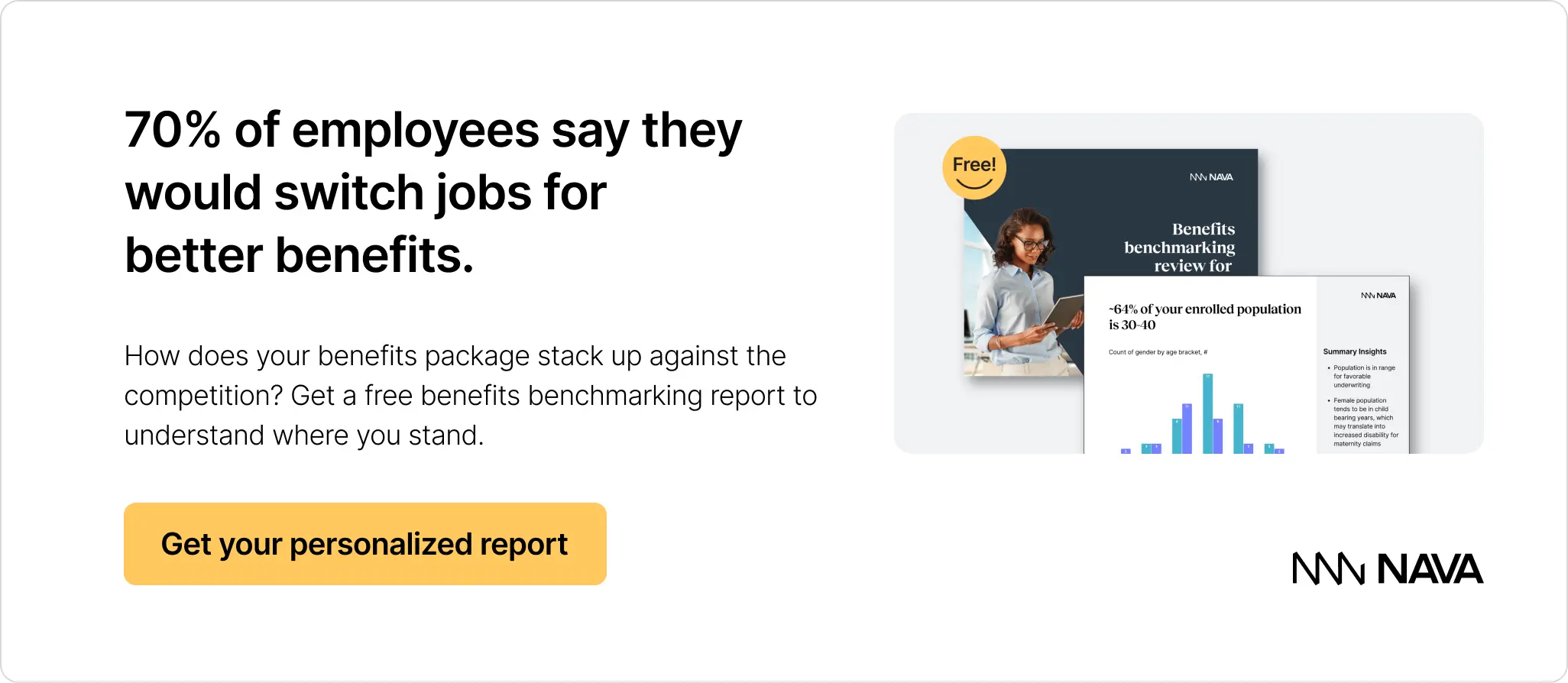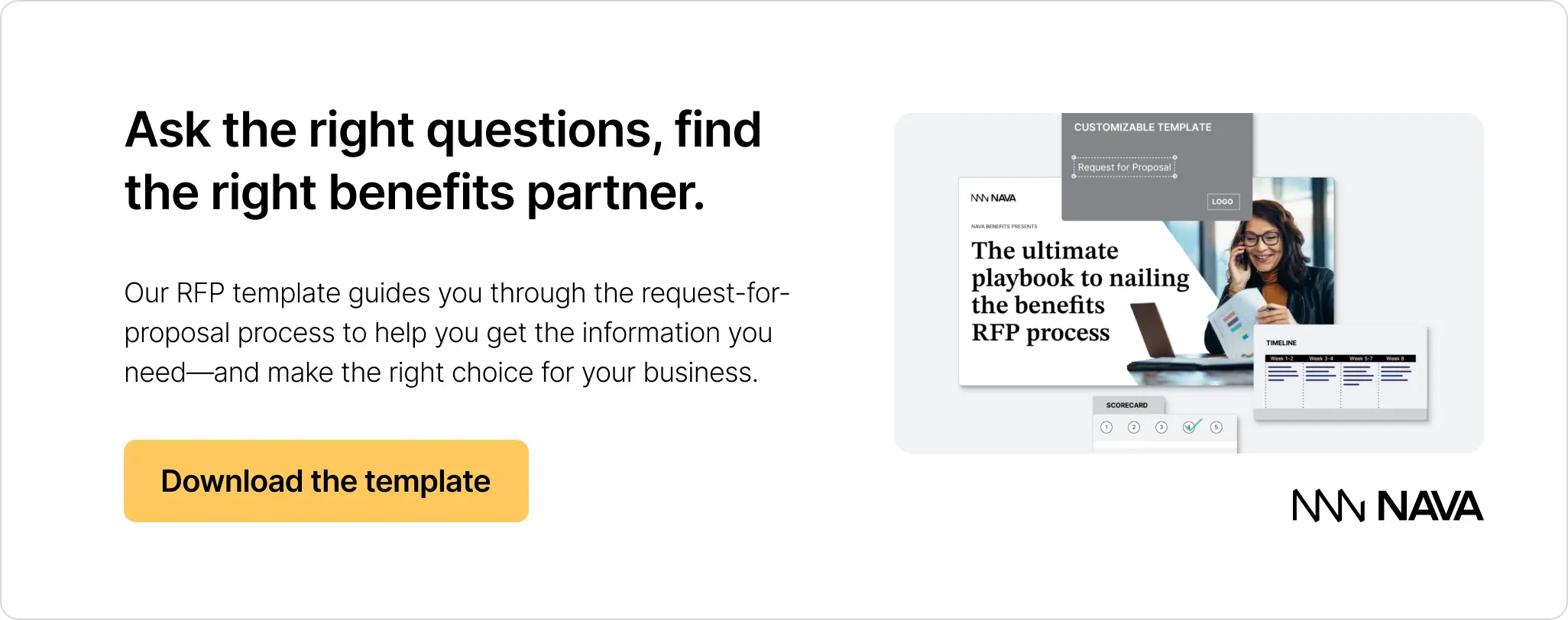6 questions to ask your employee benefits broker at renewal: the ultimate broker evaluation checklist

Renewal season is the perfect time to step back and evaluate whether your benefits broker is truly delivering for your organization. In this guide, we share six essential questions every HR leader should ask their broker during renewal, from cost-containment strategies to employee engagement support. Use this ultimate broker evaluation checklist to ensure you’re getting the insights, transparency, and partnership you need to deliver a competitive, cost-effective benefits program.
Renewal season is one of the most critical times of year for HR and finance teams. Decisions made in these few months shape not only your company’s costs but also the employee experience for the year ahead. Yet too often, employers accept renewal proposals from their employee benefits broker without asking the tough questions that can uncover cost savings, innovation, and accountability.
Your benefits broker should be more than a middleman. They should be a strategic partner helping you evaluate options, prepare for negotiations, and guide you toward better employee health outcomes. In this article, we’ll cover the 6 essential questions you should ask your benefits broker during renewal, along with red flags to watch for and practical next steps.
The role of an employee benefits broker (and why you should evaluate them annually)
Your benefits broker isn’t just a middleman between you and the carriers. At their best, they wear many hats: negotiator, consultant, strategist, employee advocate, and even an extension of your HR team. They should be guiding plan design, scouting new vendors, troubleshooting employee issues, and advising leadership on long-term benefits strategy.
A high-performing broker will:
- Proactively bring alternative vendor options to the table
- Benchmark your plan against industry peers
- Recommend cost-saving strategies while protecting employee experience
- Measure their performance with transparent metrics
If your broker isn’t delivering in these areas, renewal season is the perfect opportunity to reset expectations and ensure accountability.

6 questions to ask your employee benefits broker at renewal
1. Can you present a strategy and timeline for alternative vendor options?
Your broker should bring you at least 2–3 vendor alternatives well before renewal deadlines. This allows you to compare networks, digital health solutions, and funding strategies without being rushed.
✅ Good answer: “We’ll run an RFP by [X date], share a vendor shortlist by [Y date], and guide you through employee impact modeling.”
⚠️ Red flag: “We’ll see what the carrier offers and go from there.”
2. What cost-saving strategies can we deploy this year with minimal disruption?
Cost containment doesn’t always require sweeping changes. Smart tactics can include:
- Prior authorization for high-cost procedures
- Steering programs or centers of excellence
- Tiered networks
- Pharmacy benefit optimizations
Ask your broker to show projected savings vs. disruption for each approach, based on your claims data.
3. Which digital health or telehealth solutions should we consider for our population?
Today’s workforce expects benefits that meet them where they are, and that increasingly means virtual care. Your broker should be helping you navigate this shift by recommending solutions that actually match your population’s needs.
From mental health to maternity to chronic care, digital health vendors are reshaping the benefits landscape. A strong broker should:
- Match solutions to your workforce data (e.g., chronic disease prevalence, age demographics)
- Evaluate vendor integration into your existing medical plan
- Provide case studies or benchmarks from similar employers
This ensures you invest in programs that deliver measurable engagement and ROI.
4. What high-performance or alternative network options are available?
Most traditional fully insured plans use broad networks, which prioritize access to as many providers as possible. High-performance networks (HPNs) take a different approach: they focus on curating top-performing providers based on cost, outcomes, and quality. The goal is to deliver better care at a lower overall cost by steering employees toward providers who consistently perform well.
Your broker should help you evaluate:
- Savings potential compared to broad networks
- Provider quality measures
- How to communicate changes to employees so they feel supported
Even if you’ve always relied on a broad network, it’s worth asking your broker about HPNs or alternative network models. They may uncover opportunities to improve both cost efficiency and employee care.
5. How do we measure your performance and hold you accountable?
Your broker should be open to transparent KPIs, such as:
- Renewal cost trend vs. benchmark
- Employee satisfaction with benefits
- Speed of issue resolution
- Vendor adoption rates
It’s also fair to ask about how your broker gets paid, whether through commissions, fees, or a blend. A good partner will be transparent about their compensation structure and explain how it aligns with your organization’s goals.
6. What’s the renewal timeline and what milestones should we hit together?
Last-minute renewals limit your leverage. Your broker should map out a clear process, including:
- Data collection and analysis
- RFP or market check deadlines
- Negotiation windows
- Employee communication rollout
A clear timeline prevents surprises and ensures your team has enough time to evaluate options.
Red flags to watch for during renewal season
If you hear these from your broker, it may be time to reconsider the relationship:
- “There just aren’t any alternatives this year.”
- Lack of transparency in commissions or fees
- One-size-fits-all vendor recommendations
- No data-driven reporting on outcomes
Frequently Asked Questions
When should we start renewal planning?
Ideally, 4–6 months before your renewal date to allow for proper benchmarking and vendor evaluation.
How many vendor options should we review?
At least two serious alternatives to your incumbent carrier or vendor.
What’s a reasonable broker fee?
Compensation structures vary, but transparency is key. Ask for a full breakdown of fees and commissions.
What’s the difference between a high-performance and broad network?
HPNs focus on top-performing providers with lower overall cost and higher outcomes, while broad networks maximize access but may dilute quality controls.
How can we tell if our broker is bringing enough innovation to the table?
Look for whether they regularly present new vendor options, digital health solutions, or plan design strategies — not just at renewal, but throughout the year.
Do we need to run an RFP every renewal cycle?
Not necessarily. RFPs are most valuable when you suspect your current carrier or vendor isn’t meeting your needs. At a minimum, ask your broker to do a market check so you know how your plan compares.
What role should employees play in renewal planning?
Employee feedback is critical. Consider running a short benefits survey before renewal so your broker can tailor recommendations to actual workforce needs.
Can we switch brokers mid-year if we’re unhappy?
Yes. Your benefits plan can stay in place while you change the broker of record. Many employers make a change outside of renewal to get stronger support or fresh strategies.







